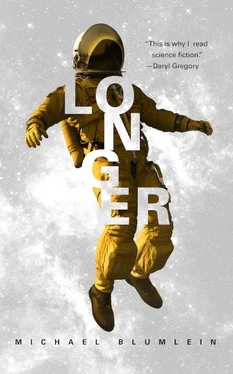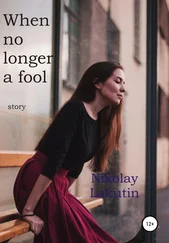Big, airy, neat, and bright, with four large stainless-steel tables on the ground floor, two more on the upper, equipment of every sort hanging on pegboards, resting on overhead racks, standing on edge against walls, and hidden in meticulously labeled cabinets and drawers. On one of the tables was an open metal box stuffed with wires and circuit boards, with a sleeve jutting out that connected to a jointed arm that ended in a cup with a rubber ball. (A game of catch? Batting practice? His host didn’t seem the type. Of fetch? More likely, but with what? He’d seen no pets.) On another was version 3.4 of his patented, custom-made, automated feline feeder, adapted to the outdoors to service ferals, and equipped with mo detection and facial analytics to exclude skunks, raccoons, opossums, rats, and other party crashers. It was working well except for the opossums, which were somehow eluding the software.
“Maybe they’re playing possum,” suggested Dashaud.
Cantrell gave him a look. “What else would they be playing?”
Industrious, inventive, and literal to a fault. Dashaud loved the guy. He was there for a reason but didn’t mind putting it off.
Cantrell moved the metal box, then returned to the table, which was bolted to the concrete floor. He pulled out his handheld, entered a code, and a tawny, green-eyed tabby appeared on-screen. He touched one of the tabby’s eyes, swept his finger to an ear, then a paw, then repeated this in reverse. After the third time the tabby mewed, and scampered offscreen. Cantrell stepped back. Four previously hidden seams appeared in the floor, which opened like a door. The table swung up and over to reveal a set of stairs.
“My hideaway,” said Cantrell.
“They’re down there?”
“Safe and sound. Go ahead. Light’ll come on by itself.”
He hadn’t set eyes on one for years. Had made his peace. You did what you did. In hindsight everyone was guilty of something.
He started down.
The light came on.
Water under the bridge.
He reached the bottom.
The losers were the ones who never did anything.
The room was cave-like. A refrigeration unit sat on the floor in front of him, connected via hose to a cupboard-sized stainless-steel panel mounted on a wall.
They were in the panel. Had to be.
His heart was in his throat.
Cantrell was right behind him. “Excited?”
He shrugged.
“Guess that’s a yes. Let’s not prolong the suspense.”
He strode forward, put his hand on the panel, then paused, prolonging it. “Not that there is any. Don’t get the wrong idea. They’re in tip-top shape.”
“I’m sure they are.”
“You bet they are. Couldn’t be better.” He ran his finger along the panel’s edge with evident affection. “I check them regularly. I have a system. You don’t want to take too long. Don’t want to risk disturbing them.”
One by one he released the panel’s clamps, and slowly removed the cover. There were three of them nestled behind a thick plate of glass, curled like commas, barely touching, suspended in translucent fluid, with no room to spare.
Dashaud’s stomach lurched.
His mind rebelled. He took a step back, repulsed.
What had he done?
And yet.
When was progress ever black and white? How else did men and women advance?
They were hideous. Appalling.
But beautiful, too.
Beautifully conceived, designed, and executed. He couldn’t forget the day they came to life. His pride and joy.
His creations.
Cantrell was champing at the bit. “So? What do you think?”
“They’re hibernating?”
“Of course.”
He had a welter of emotions, which he cloaked behind a professional veneer. “Fully functional?”
“Will be, once they’re thawed out.”
Naturally, he’d say this. “How cold do you keep them?”
“Cold as I can without harming them. Just above freezing. Never lower than point-three, higher than point-seven. Narrow range.”
“You made the cooling system?”
“All of it. Cooling, housing, electronics.”
“Impressive.”
“The premade stuff is junk. Even the good stuff is never quite what you need. Doing it yourself saves time in the end. Saves money.” He touched the glass, traced the outline of one of them. “I’m quite fond of this particular system.”
Dashaud leaned in to study it closer. An intricate puzzle of hoses, filters, gauges, housing, and circuitry. Ingenious and original, though his eye, understandably, kept wandering to the living contents.
“It’s a work of art,” he said.
“Does the job,” replied Cantrell, basking.
“How long have you had them?”
“Ten years next month.”
“Like this?”
“Pretty much.”
“Long time.”
“They’re worth holding onto.”
Not what he was getting at. “How do we know they’re still good?”
“It’s a good system. Works on mice, rabbits, monkeys. All your basic vertebrates. No reason it’s not going to work with these. Would have been easier if you’d engineered them with an eye toward longevity. But they’ll be fine. Warm ’em up, you’ll see.”
He replaced the cover, clamped it down, and ushered Dashaud upstairs. In the workshop he pointed out a similar-looking panel, this one portable.
“Longevity wasn’t our aim,” Dashaud replied defensively. “Our concerns were more immediate.”
“Knee-jerk,” said Cantrell.
“Urgent.”
“Ecologically unsound.”
“How so?”
“You made them disposable.”
“Readily available and easy to use,” said Dashaud. The description the makers preferred.
“Not saying it was a flaw in the design. In the planning, more like. Strictly short-term. Not seeing the forest, et cetera, et cetera. What governments do.”
“What’s the forest?”
“You’re here, aren’t you?”
“Completely different reason. There’s no threat, real or otherwise. No danger. No anything.”
Cantrell wasn’t buying it. “You’re just spending money for the fun of it? You’re a collector maybe? A dealer in rare things?”
He was fishing, and wasn’t far off. In a way they did belong in a museum.
“Research,” said Dashaud.
“On what?”
“Classified. Sorry.”
Cantrell nodded knowingly, a gleam in his eye, then escorted his guest out of the workshop. In the house he offered him shark and Aquavit.
Dashaud was touched: the guy had done his research, and gone out of his way. But shark? In the desert? A thousand miles from any ocean, not to mention the chill waters of Iceland, where proper sharks were caught, beheaded, fermented, and hung to dry. Nothing could touch them for flavor and taste. He’d been spoiled by perfection, and took a pass.
“A drink would do nicely.”
Cantrell poured them each a glass. Dashaud removed his gloves.
“Something wrong with your hands?”
“Not a thing.” He explained his recent augmentation.
“Nice. So now you’re a super surgeon. I guess that’s what it takes these days.”
“Takes?”
“To hold the line. Keep the robots at bay. Personally, I’d take one of them over a human. No offense.”
“None taken.”
“Better outcomes. Steadier hands.”
Dashaud glanced at his own. Steady as a rock.
“Had one once,” said Cantrell. “Did a great job.”
“How was its bedside manner?”
“Very professional.”
Dashaud could imagine. Now and then he toyed with becoming a veterinarian. Maybe the time had arrived.
“Can we get down to business?”
“Sure thing.”
He was surprised to learn that Cantrell did not own the HUBIES. [3] A word of apocryphal origin. 1. An acronym for Hybrid Usable Body in Idiosyncratic Encephaloid State; alternatively, HUman Boosted Inhalation Experiment; 2. An insult, a slur; 3. A tribute, an accolade, an expression of esteem, as in “She hubied herself for the cause”; 4. Brainless and stupid; 5. An anagram for SHIEBU, goddess of perfume and good deeds; 6. A portmanteau of “hubris” and “boobie.”
Had somehow missed the law declaring that ownership was a crime, while using was not. A strange disconnect, not unheard of in the annals of ethics and morality. Use alone was problematic for the vast majority of people. There was a fine line, some said no line at all, between use and abuse.
Читать дальше











